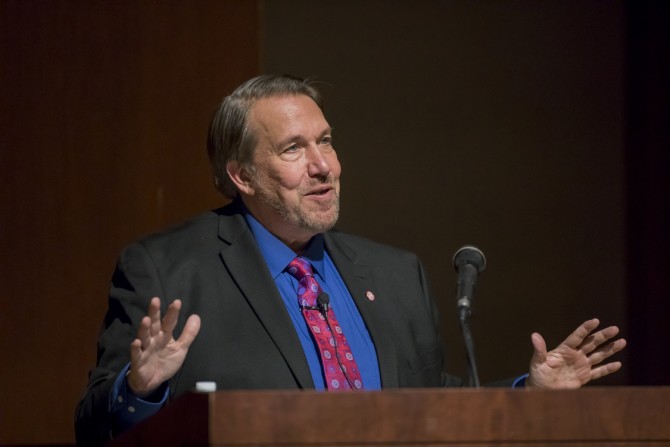Former State Department official talks cyber diplomacy in Bartels lecture
By Justin Welfeld
Returning to Cornell to give the annual Bartels World Affairs Fellowship Lecture Nov. 15, Christopher Painter ’80, former coordinator for cyber issues at the U.S. Department of State, discussed the power – and the limitations – of cyber diplomacy in a public lecture in Kennedy Hall’s Call Auditorium.
Painter described the excitement of combining diplomacy, a “well-oiled and honed discipline,” with information technology, a new space without formal rules or precedent. He acknowledged cyberspace as an expansive and robust platform for economic and social exchange, but warned that this value also makes it a prime target for malicious actors.
“Cybersecurity is a highly technical issue that has deeply economic, social, political and legal dimensions,” he said, and “demands collaboration across disciplines, professions and ideologies to produce complex solutions to complex problems.”
It also demands collaboration among government agencies, nations, industries, and other players, Painter said. He described initiatives he led to boost international cooperation and develop a set of cyber norms, but conceded that their effectiveness is limited by a lack of tools for punishing bad actors for their behavior. He said this “will be solved only by building bridges between the policy community and the technical community, and that is something that happens at institutions like Cornell.”
On concerns about whether President Donald Trump has impeded multilateral cooperation in cyberspace, Painter said, “Frankly, we are doing exactly what we did in the last administration: building a multilateral community through bilateral and small-group discussions, and it is working quite well.”
Still, he continued, it is “worrisome” that the commander in chief will not acknowledge Russia’s meddling in the U.S. presidential election since it thwarts efforts to determine who was behind the Russian interference.
Russia is not the only country of concern, Painter said. Nations have “vastly different perspectives on the future of information and the internet,” he said. “We have countries which are using the internet to monitor citizens and curtail freedom of speech … and this has huge human rights implications.”
In recognition of this, one of Painter’s major diplomatic objectives was to convince developing nations to choose a free internet to stimulate economic growth and global connectivity.
Painter spoke about a few of the high-profile cyber attack cases during his tenure as cyber coordinator, including the North Korea Sony Pictures hack, the Saudi Aramco hack, the WannaCry ransomware attack and the recent Equifax intrusion.
He warned of the potential seriousness and long-term consequences of a debilitating infrastructure attack against control systems, water and power utilities, and financial institutions. Emerging areas of concern include threats to the integrity of information, such as meddling with electronic health records and distributed denial-of-service attacks (the use of malicious software to block access to websites or other online services) originating from smart home appliances and other connected technologies, he said.
The Henry E. and Nancy Horton Bartels World Affairs Fellowship, hosted by the Mario Einaudi Center for International Studies, brings distinguished leaders in the international community to Cornell’s campus.
Justin Welfeld ’20 is a writer intern for the Cornell Chronicle.
Media Contact
Get Cornell news delivered right to your inbox.
Subscribe